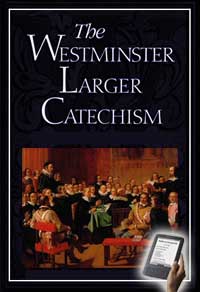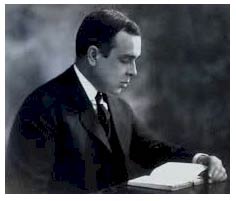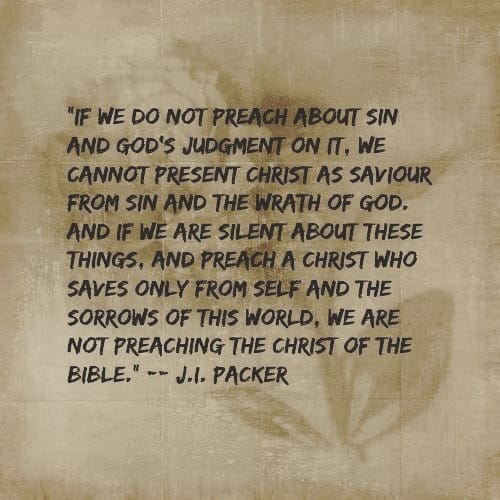Do the 10 Commandments Apply to the Christian?
 Question: If I deny the transfer of the ten commandments from the old covenant into the new covenant, am I considered Reformed? I'm still covenantal?
Question: If I deny the transfer of the ten commandments from the old covenant into the new covenant, am I considered Reformed? I'm still covenantal? Question: If I deny the transfer of the ten commandments from the old covenant into the new covenant, am I considered Reformed? I'm still covenantal?
Question: If I deny the transfer of the ten commandments from the old covenant into the new covenant, am I considered Reformed? I'm still covenantal? by J. Gresham Machen
by J. Gresham Machen The following free eBooks by Benjamin Warfield are available in ePub,.mobi and .pdf formats, accessible for your eReading device. These are classic works which are all highly recommended. We believe no one should be held back from having a significant library of these important works because of cost so please spread the word to your friends so as many people as possible can make good use of this edifying literature.
The following free eBooks by Benjamin Warfield are available in ePub,.mobi and .pdf formats, accessible for your eReading device. These are classic works which are all highly recommended. We believe no one should be held back from having a significant library of these important works because of cost so please spread the word to your friends so as many people as possible can make good use of this edifying literature.
Faith and Life (eBook) by B. B. Warfield
Studies in Theology (eBook) by B. B. Warfield
Biblical Doctrines (eBook) by B. B. Warfield
The Inspiration and Authority of the Bible (eBook) by B. B. Warfield
The Person and Work of the Holy Spirit (eBook) by B. B. Warfield
The Person of Christ According to the New Testament (eBook) by B. B. Warfield
The Power of God Unto Salvation (eBook) by B. B. Warfield
The Plan of Salvation (eBook by B. B. Warfield
Calvin and Calvinism (eBook) by B. B. Warfield
Augustine & The Pelagian Controversy (eBook) by B. B. Warfield
 "As Christians, we don't need to 'win' when it comes to politics. We don't need to tie our hopes to one party or react with fury when the other guy gets in, as though some mere human might thwart God's plans - as though God sits in heaven and says, 'Oh this democratic system is really messing things up. I can't achieve my plans now they voted for that one. They were meant to chose the other way!.' As the pastor Juan Sanchez puts it in his book 1 Peter for you:
"As Christians, we don't need to 'win' when it comes to politics. We don't need to tie our hopes to one party or react with fury when the other guy gets in, as though some mere human might thwart God's plans - as though God sits in heaven and says, 'Oh this democratic system is really messing things up. I can't achieve my plans now they voted for that one. They were meant to chose the other way!.' As the pastor Juan Sanchez puts it in his book 1 Peter for you:
"Our sovereign Lord knows what he is doing. Just as he wastes no suffering, he also doesn't waste any government appointment. We may not understand why a particular person is in power, but we can rest assured that our King does."
After all, this is his story, the end is already certain, and he is writing the script.
When we operate out of fear, we view the political arena as a place in which to legislate and control morality, or as a way to gain control of our world to protect ourselves, or as something altogether evil to be shunned. But those who operate out of courage see politics as a way to seek the common good, to promote human flourishing, and ultimately to love others.
Courage gives us the ability, in this age of unbelief, to speak positively and seek unity, to love those who disagree with us and seek to malign us, to be unsurprised and not angered when a society that rejects Christ does not line up its laws with those of Christ - and to keep on loving and seeking to bless.
That takes far more courage than opting out or getting mad.
-----
 by Stephen Charnock
by Stephen CharnockThe goodness of God is the most pleasant perfection of the Divine nature.
His creating power amazes us. His conducting wisdom astonisheth us. His goodness, as furnishing us with all conveniences, delights us and renders both His amazing power, and astonishing wisdom, delightful to us.
Just as the sun, by effecting things, is an emblem of God’s power, so also by discovering things to us, it is an emblem of His wisdom. But by refreshing and comforting us, the sun is an emblem of His goodness.
And without this refreshing virtue it communicates to us, we should take no pleasure in the creatures it produceth, nor in the beauties it discovers.
As God is great and powerful, He is the object of our understanding. But as good and bountiful, He is the object of our love and desire.
The goodness of God comprehends all His attributes. All the acts of God are nothing else but the streams of His goodness, distinguished by several names, according to the objects it is exercised about.
As the sea, though it be one mass of water, yet we distinguish it by several names, according to the shores it washeth, and beats upon. When Moses longed to see His glory, God tells him, He would give him a prospect of His goodness (Ex. 33:19): ‘I will make all My goodness to pass before thee.’
His goodness is His glory and Godhead, as much as is delightfully visible to His creatures, and whereby He doth benefit man: ‘I will cause My goodness,’ or ‘comeliness,’ as Calvin renders it, ‘to pass before thee.’
 by Thomas Brooks
by Thomas BrooksA second property of an humble soul is this, He overlooks his own righteousness, and lives upon the righteousness of another, to wit, the Lord Jesus. So the apostle, (Philip. 3:8–10), overlooks his own righteousness, and lives wholly upon the righteousness of Christ: ‘I desire to be found in him,’ saith he, ‘not having mine own righteousness.’
Away with it, it is dross, it is dung, it is dog’s meat! It is a rotten righteousness, an imperfect righteousness, a weak righteousness, ‘which is of the law; but that which is through the faith of Christ, the righteousness which is of God by faith,’ that is a spotless righteousness, a pure righteousness, a complete righteousness, an incomparable righteousness; and, therefore, an humble soul overlooks his own righteousness, and lives upon Christ’s righteousness.
Remember this, all the sighing, mourning, sobbing, and complaining in the world, doth not so undeniably evidence a man to be humble, as his overlooking his own righteousness, and living really and purely upon the righteousness of Christ. This is the greatest demonstration of humility that can be shewn by man, (Mat. 6:8).
Men may do much, hear much, pray much, fast much, and give much, &c., and yet be as proud as Lucifer, as you may see in the Scribes, Pharisees, Mat. 23, and those in Isa, 58:3, who in the pride of their hearts made an idol of their own righteousness: ‘Wherefore have we fasted,’ say they, ‘and thou seest it not? wherefore have we afflicted our souls, and thou takest no knowledge?’
 In the decrees of the Council of Trent: Canons on Justification, Roman Catholics proclaim a curse (anathema) on anyone who affirms the loss of free will after the fall. In Canon 5, it declares:
In the decrees of the Council of Trent: Canons on Justification, Roman Catholics proclaim a curse (anathema) on anyone who affirms the loss of free will after the fall. In Canon 5, it declares:
"If anyone says that after the sin of Adam man's free will was lost and destroyed, or that it is a thing only in name, indeed a name without a reality, a fiction introduced into the Church by Satan, let him be anathema."
----
By doing so, they are anathematizing their own doctor of the church, St. Augustine for he said precisely this: on multiple occassions:
"Man when he was created received great powers of free will, but lost them by sinning." - Confessions
Can they do anything by the free determination of their own will? Again I say, God forbid. For it was by the evil use of his free-will that man destroyed both it and himself. For, as a man who kills himself must, of course, be alive when he kills himself, but after he has killed himself ceases to live, and cannot restore himself to life; so, when man by his own free-will sinned, then sin being victorious over him, the freedom of his will was lost.
Augustine, Enchiridion 9.30
“Such victory and emancipation cannot, without God's grace, be achieved by the human will, which is by no means to be called free so long as it is subject to prevailing and enslaving lusts; "For of whom a man is overcome, of the same is he brought in bondage." And the Son of God has Himself said, "If the Son shall make you free, you shall be free indeed.“ Letters 145
 by J. I. Packer
by J. I. Packer“If we do not preach about sin and God’s judgment on it, we cannot present Christ as Saviour from sin and the wrath of God. And if we are silent about these things, and preach a Christ who saves only from self and the sorrows of this world, we are not preaching the Christ of the Bible.
We are, in effect bearing false witness and preaching a false Christ. Our message is ‘another gospel, which is not another.’ Such preaching may soothe some, but it will help nobody; for a Christ who is not seen and sought as a Saviour from sin will not be found to save from self or from anything else.
An imaginary Christ will not bring a real salvation; and a half-truth presented as the whole truth is a complete untruth.”
-----
From J.I. Packer, “The Puritan View of Preaching the Gospel,”
"Sexual hedonism is another expression of a low view of women. In ancient Greek and Roman culture, it was widely accepted that husbands would have sex with mistresses, concubines, slaves, and prostitutes (both male and female). An ancient Athenian saying was, “Wives are for legal heirs, prostitutes are for pleasure.” In Rome, the taxes collected from prostitution constituted a significant portion of the royal treasury. (This may be one reason Jesus hung out with prostitutes: There were so many of them!)
By contrast, the church fathers wrote sermons urging husbands not to have sex with slaves or prostitutes. These practices were not easy to eradicate. In the fourth century, John Chrysostom was still preaching on why it’s not okay for married men to have sex with their slaves. An ancient Christian treatise on the sufferings endured by married women included the “humiliation” of being replaced by servants in their husbands’ affections.
Prayer is essential to the Christian life.
It is essential to the Christian life because prayer was essential to the life of Jesus (Matthew 6:1-15, 14:23; Luke 5:16, 22:39-41; Hebrews 5:7.)
Theologian Andrew Murray, who arguably has written more than anyone on the subject of prayer in the daily life of the Christian, once declared, “Abiding fully [in Christ] means praying much.”
Those of us who, by God’s grace (Ephesians 2:8-9), have come to faith in Christ, serve a God who desires that we come to Him with our prayers and petitions (Philippians 4:6.)
In fact, He delights in it (Proverbs 15:8.)